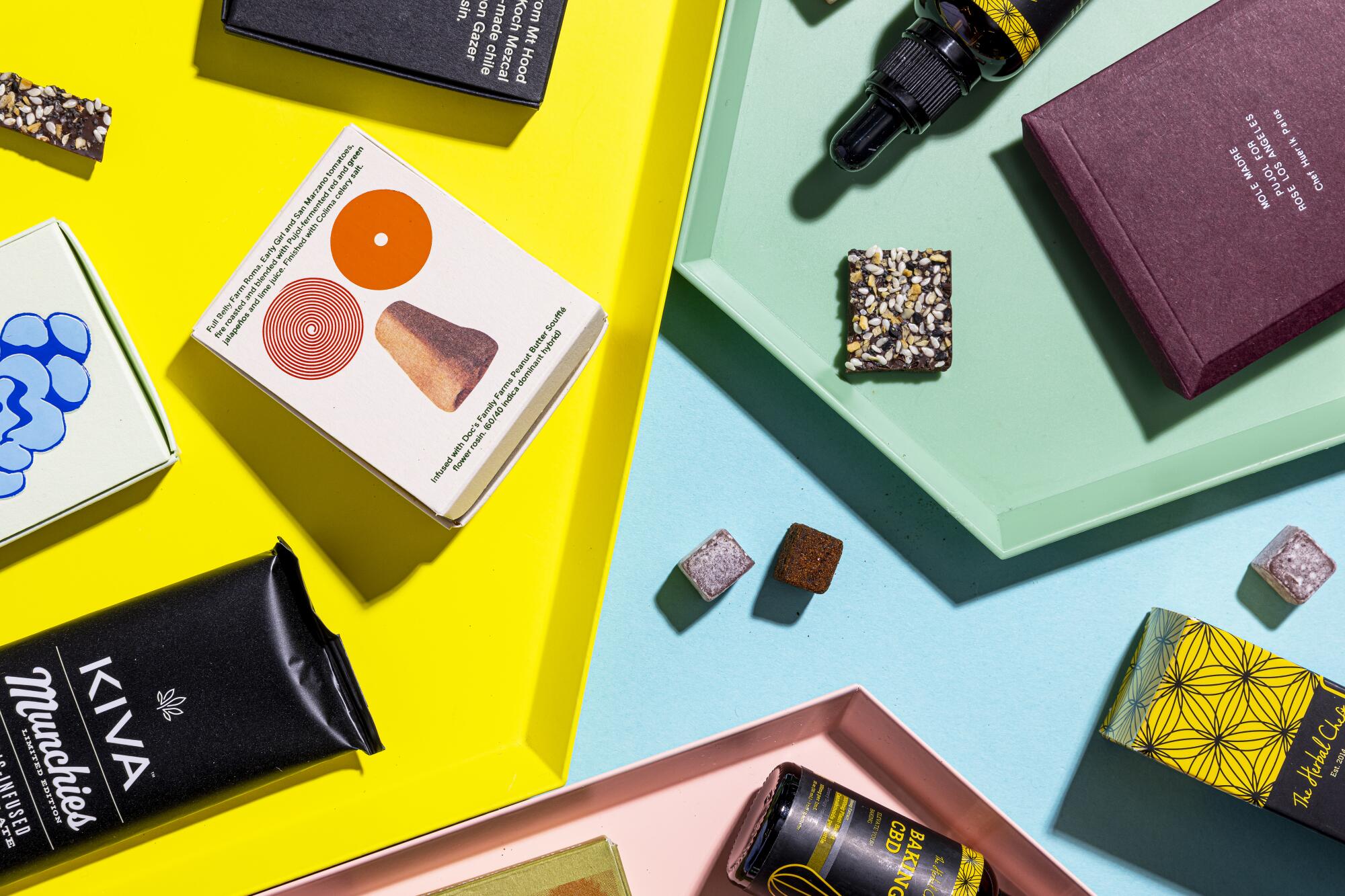
Chefs like Enrique Olvera and local hit The Yeastie Boys are collaborating with cannabis companies to make seasonal THC and CBD edibles.
Enrique Olvera has been feeding his mole madre for years, replenishing the fine mix of black, red and green chilhuacle chiles with seasonal seeds and fruits for a complex, ever-changing flavor base. You can taste it primarily at Pujol, his Mexico City restaurant, but not at the chef’s Damian in the Arts District; those in Los Angeles hoping to try the mole can have it delivered directly to their door as a CBD-infused chocolate bar.
Olvera is among many chefs lately teaming up with cannabis brands to bring a more epicurean edge to the edibles market, a smokeless industry that’s seen an increase in sales since the COVID-19 pandemic began. In late 2020, even Martha Stewart joined the cause with a line of CBD gummies, drops and candy ribbons.
Olvera’s collaborations with Rose — an agricultural- and ingredient-minded cannabis company based in San Francisco and L.A. — most recently resulted in his pastry chef, Huerik Palos, flying to the Bay Area with a container of the mole madre. At that point, it had been aged for 2,714 days.
Rose co-founder Nathan Cozzolino says Olvera has hit him with several inspiring ideas: What if he could replicate a michelada, but trade the bitter edge of beer for the bitter, herbal taste of cannabis, then dust the cube-shaped THC edible with freeze-dried celery powder and salt? Or re-create the flavor of mezcal-poached pears, coated with ancho chiles. And then there’s this: After hearing that Rose was growing ground cherries on a 10-acre farm in the Sierra foothills, Olvera suggested developing a cola syrup from scratch with Palos to blend it with the farm’s fruit, replicating the taste of nostalgic Coke-bottle gummies.
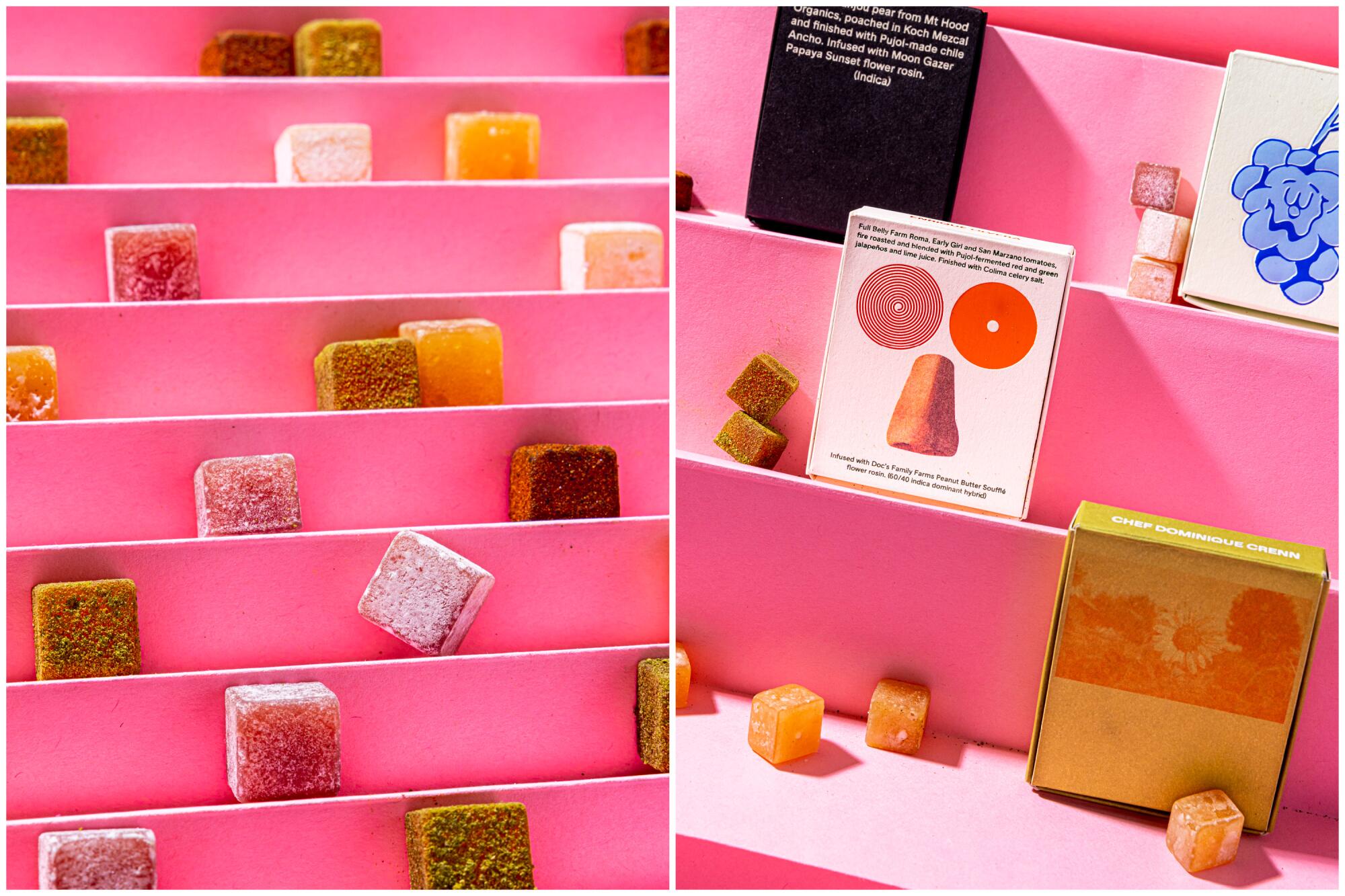
As a chef, the possibilities are seemingly endless; as a consumer, the brand’s limited-run Delights, which texturally fall somewhere between a jelly candy and Turkish delight, offer new collaborations every few months. To Rose, the rapid turnover isn’t a marketing ploy. It’s a way to reimagine the edibles industry with farm-fresh produce instead of synthetic flavorings.
“A lot of the product in the space is thought of once and then produced a million times. We have many ideas, and we produce it a few times, then move on to the next idea,” says Cozzolino. “Considering that everything is connected to seasonal produce and seasonal cannabis, it just makes sense to have the ideas always changing with the seasons.”
At Rose, your 5mg Delight might contain tomatoes from Dirty Girl Produce in Santa Cruz or stone fruit from Blossom Bluff Orchards in Parlier, Calif. It might be a collaboration with L.A. chefs and confectioners such as Fat & Flour’s Nicole Rucker, who used apricot, poppy and lemon verbena in her CBD cubes, or haute jelly-cake maker Lexie Park of Nünchi, whose THC cubes have blended yuzu and Chino strawberries with coconut milk.
San Francisco’s Dominique Crenn, of Michelin-starred Atelier Crenn, has collaborated on CBD squares bright with passion fruit and freshly pressed apples. San Francisco wine bar Bar Part Time teamed up with Santa Cruz winery Stagiaire Wine, which contributed partially fermented Sangiovese and Viognier grapes, for a playful Boxed Wine flavor of THC edibles. The ingredients are combined with a taffy-like flower rosin — the result of hydraulically pressing cannabis blooms sourced from the house farm and others, a bid to support small, family-run farms on every level.
However, despite the growth in interest and sales of gourmet edibles, it can still be difficult to find an audience.
“It’s been an uphill battle,” Cozzolino says. “People say, ‘Oh, people don’t want to pay $35 for a box.’ I’m like, ‘I object, because I pay $30 for a bottle of natural wine at any natural wine store.’ Any time I uncork a bottle of wine, it costs me $30, and it lasts me less amount of time.”
Given California’s role as one of the country’s chief agricultural producers as well as one of its largest cannabis cultivators, it may seem surprising that the industries weren’t widely conjoined promptly after 2016, when the state legalized recreational cannabis. Cozzolino cites hurdles for smaller operations to break into an industry that favors large corporations with massive output. When stocking product, dispensaries tend to favor larger brands that generally operate without seasonal constraints.
Some collaborations in the edibles space make use of perennial products but add local flavors as a finishing note. Kiva, a larger edibles company that offers chocolate bars, mints and gummies, sells infused chocolate bars year-round, but for 4/20 it plays into stoner tropes with the chocolate Munchies Bar and such ingredients as Fruity Pebbles and potato chips, typically created by its in-house development team. This year, Kiva teamed up with Yeastie Boys Bagels founder Evan Fox for a 100mg THC Munchies Bar that’s inlaid with the same house-made everything-bagel seasoning used at Fox’s food truck.
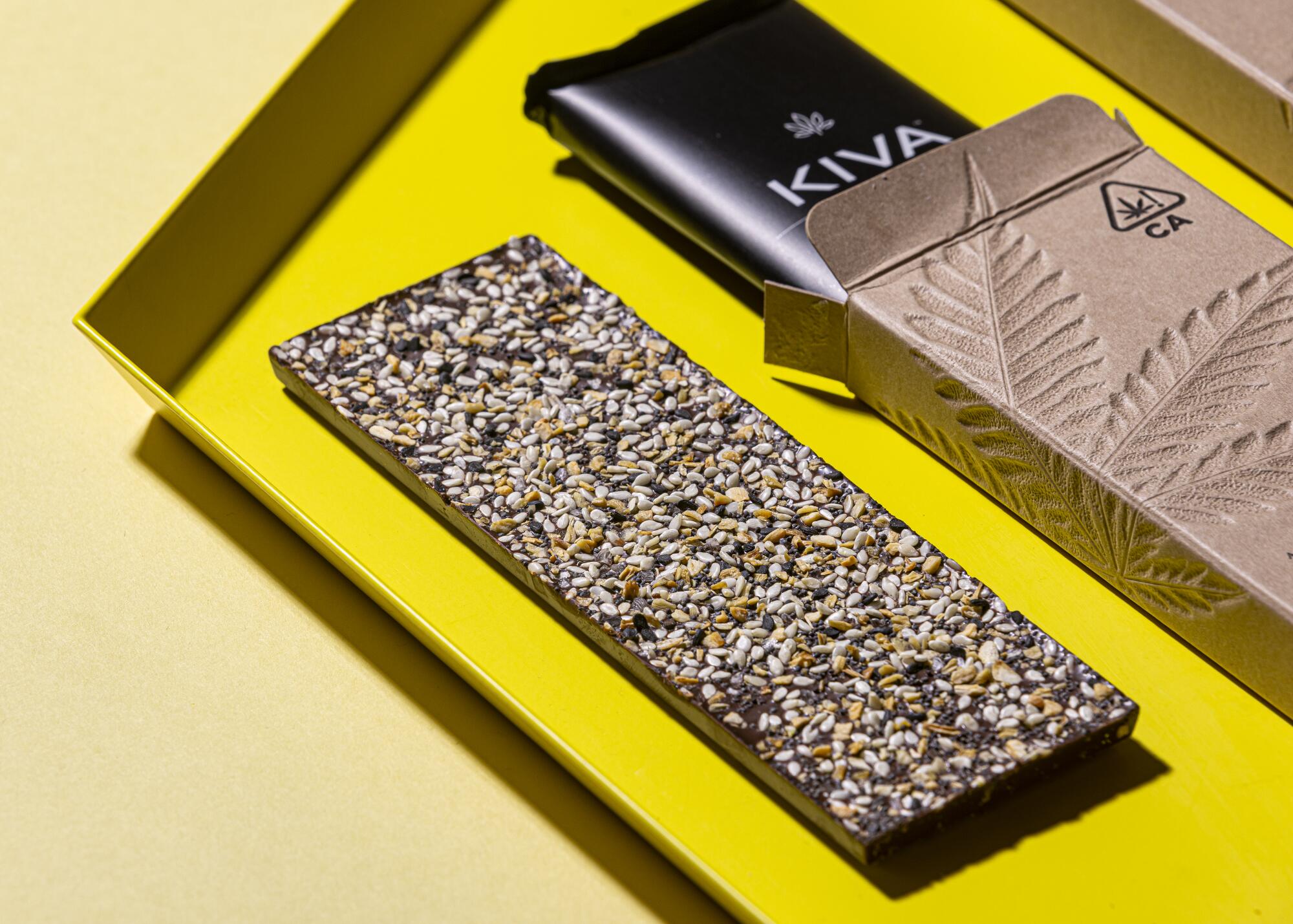
“Kiva and I connected to shoot the s— last year,” Fox says. “I originally had an idea for medicated everything seasoning, but Kiva took it a step further and brought the edible chocolate to the table, and it was a no-brainer.”
Kiva’s edibles are stocked in more than 720 dispensaries across California, but for a limited-run product like this, Miller estimates it can be found in roughly 200 — or ordered online through Kiva’s website. Fox will also be popping up at four L.A. dispensaries on 4/20, giving away bagel sandwiches with every bar purchase.
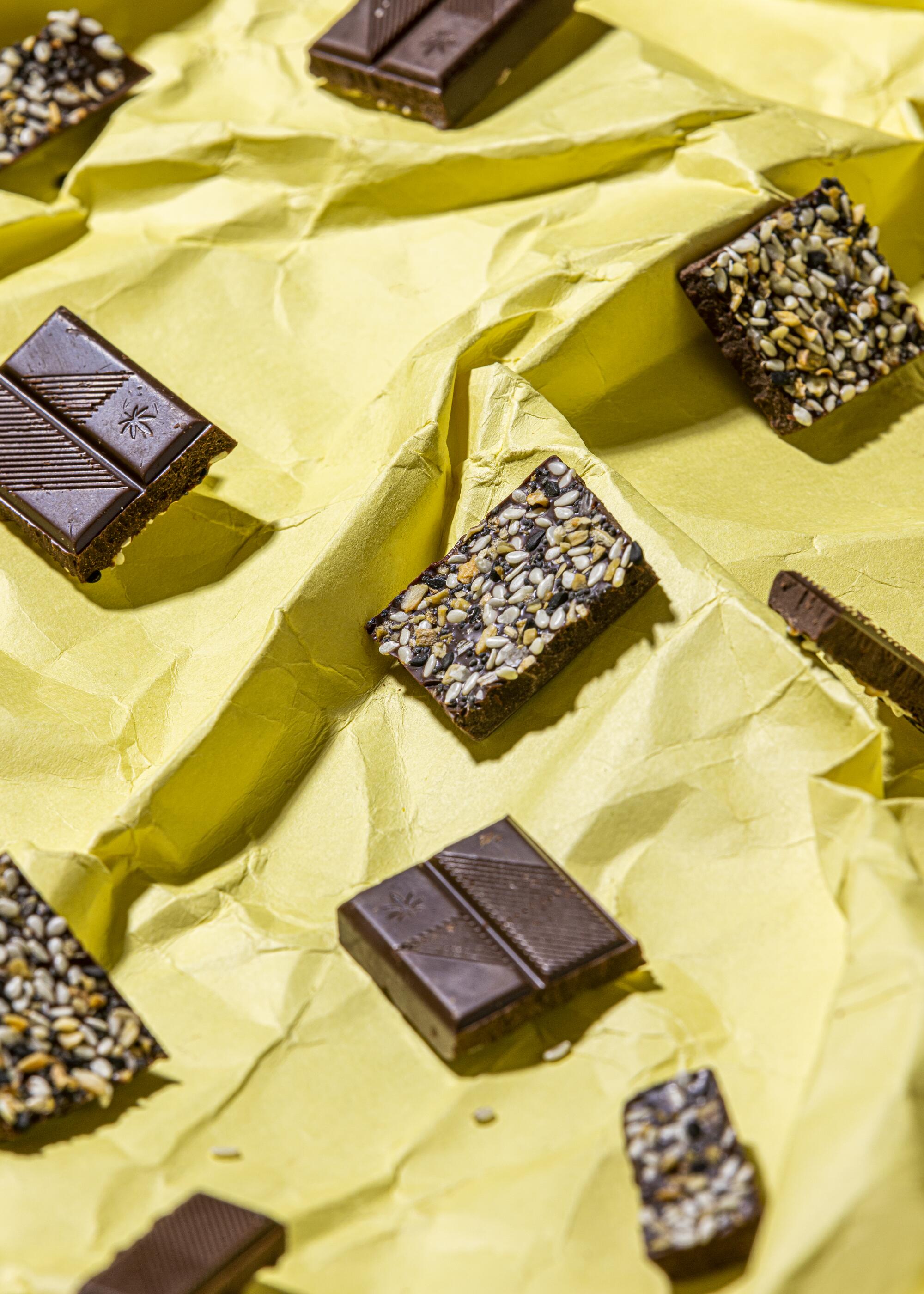
The Yeastie Boys bar marks the brand’s first product collaboration with an L.A. chef-restaurateur, and it came about as organically as one might imagine: After taste-testing Kiva product, members of Kiva’s marketing team satisfied their own munchies at the food truck parked in Silver Lake. Collaboration made sense, says Kiva marketing director Steve Miller, who frequents the truck.
Finding the right fit for an edible collaboration can be more difficult than it appears, he adds. Many chefs aren’t willing to work on a cannabis product, Miller says. “There’s always been that thing of ‘cannabias,’ ” he says, adding that Kiva is always open to collaboration.
One chef fighting cannabias is Chris Sayegh of Santa Monica’s new Nostalgia Bar & Lounge; he’s also the founder of the Herbal Chef, a private-chef catering and consulting group for cooking with cannabis.
“The mission was always to destigmatize plant medicine, and the backbone was always amazing food and beverage and hospitality,” Sayegh says.
Sayegh has been studying the medicinal uses of ingesting cannabis for roughly 10 years, gradually shifting his career goals from becoming a doctor to a chef focused on incorporating preventative medicine into his food. He hopes to serve THC and CBD in his restaurant once it’s legal; for now, he’s continuing his infused multicourse dinner series through the Herbal Chef’s members-only supper club and working on a new retail line of CBD products.
The first will be a CBD droplet for home baking, projected for release by June. It’s so concentrated with CBD that to achieve 50mg per portion of baked goods such as brownies, the addition of the liquid won’t throw off the ratio of the recipe. After that will be a CBD product designed for cooking, with a heat resilience of up to 400 degrees, and a CBD drink product.
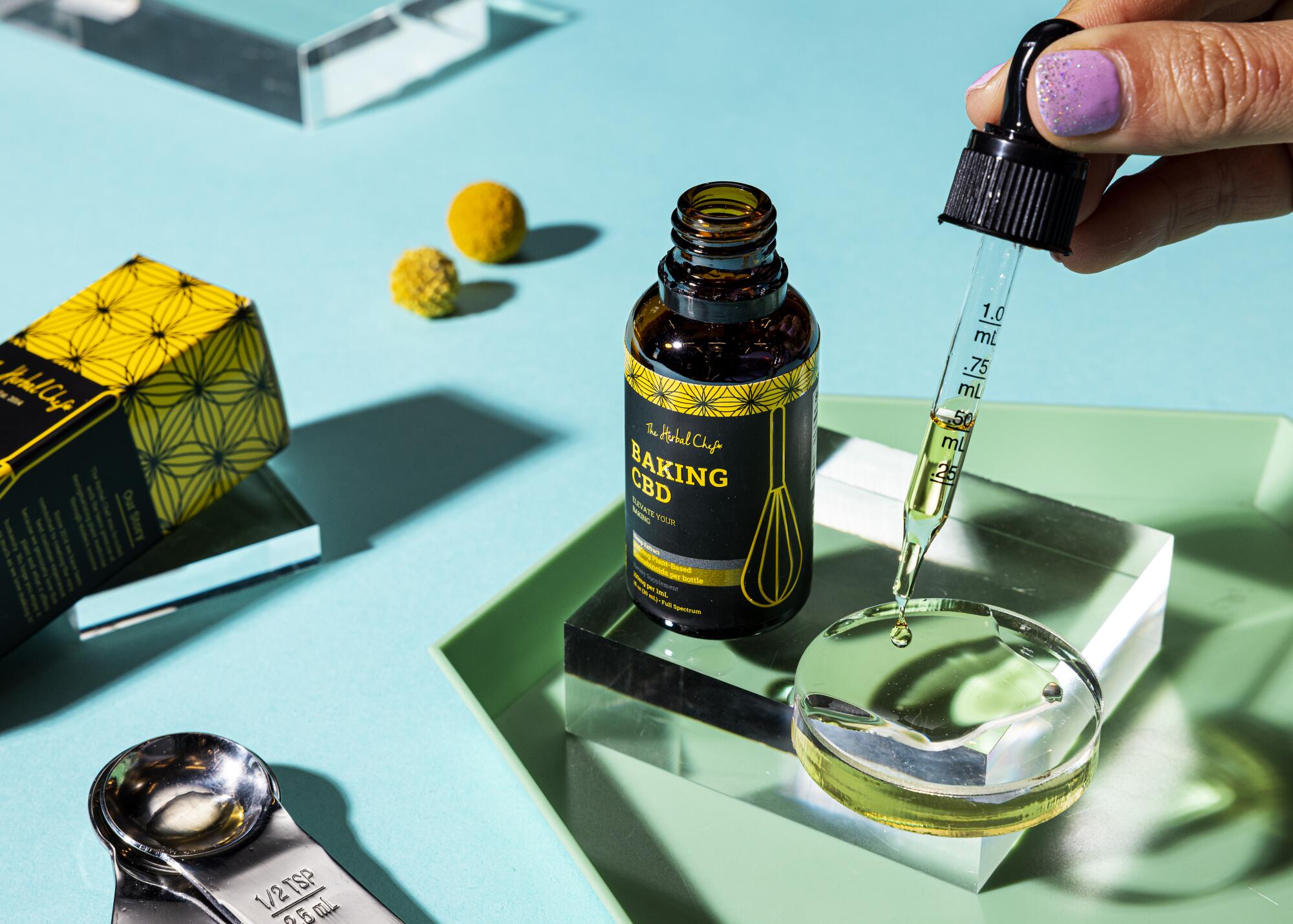
Sayegh is watching for the winds of change in cannabis consumption, lawmaking and misconception; he believes uses such as infused home cooking offer untapped business potential.
“There’s a lot of ready-to-eat consumables, which is great — that’s what the market dictated people want — but as people get more sophisticated and savvy in the industry, they’re going to want products like this,” he says. “They’re going to want to be at home and add it to what they’re making, and we just want to be able to give them the power in their pantry to do so.”
More to Read
Eat your way across L.A.
Get our weekly Tasting Notes newsletter for reviews, news and more.
You may occasionally receive promotional content from the Los Angeles Times.











